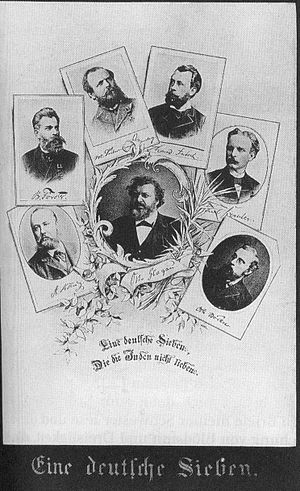- Otto Böckel
-
Otto Böckel (born 2 July 1859 in Frankfurt am Main - died 17 September 1923 in Michendorf) was a German populist politician who became one of the first to successfully exploit anti-Semitism as a political issue in the country.
Contents
Path to politics
A native of Hesse and a librarian by profession, he initially studied law at the University of Marburg but dropped it for volkskunde and became a noted folklorist.[1] In 1887 he published a pamphlet, Die Juden - die Könige unserer Zeit, in which he attacked the Jews for their perceived dominance over German life.[2] The same year he became the first independent anti-semite to be elected to the Reichstag.[2] Böckel was elected to the Reichstag on a platform of both anti-Semitism and support for the establishment of peasant co-operatives.[3] His slogan was Gegen Junker und Juden, indicating his nature as an opponent of both the Jews and the big landowners.[1] His election in Marburg, secured at the expense of a sitting German Conservative Party member, meant that he would be the youngest member of the body and helped to secure him the nickname of the 'peasant king'.[4] Böckel also published his own newspaper, Reichsherold, which was anti-clerical, anti-capitalist and advocated some radical democratic ideals as well as being highly anti-semitic.[2]
Political activity
Initially an independent at the start of the 1890s he formed his own group, the Antisemitische Volkspartei.[5] This party ran in alliance with the Deutschsoziale antisemitische partei of Max Liebermann von Sonnenberg in the 1890 election, with the new alliance capturing five seats of which four were held by Böckel's party.[6] As well as his political movement, Böckel also organised the Mitteldeutscher Bauernverein, an anti-semitic agrarian movement that counted as many as 15,000 members involved co-operative and banking schemes that purposefully sought to exclude Jews.[7] His various movements provided an early entry to politics for later figures such as Heinrich Class.[8]
Decline
However the Tivoli Congress killed off political Böckel's influence as the German Conservative Party adopted anti-Semitism and he rejected overtures from Theodor Fritsch to become part of a wider anti-semitic coalition as he disliked Fritsch personally.[9] Böckel was replaced as leader of the independent anti-semites in 1894 by Otto Hirschel and Philipp Köhler and his influence declined.[10] Meanwhile his agrarian group, hamstrung somewhat by Böckel's own lack of money was, much to his dismay, largely swallowed up by the Junker-controlled Agrarian League.[7]
He lost his seat in the 1903 election and faded into obscurity, dying in poverty.[2]
References
- ^ a b Dan S. White, The Splintered Party: National Liberalism in Hessen and the Reich, 1867-1918, 1976, p. 136
- ^ a b c d Karl Dietrich Bracher, The German Dictatorship, 1970, p. 60
- ^ Richard J. Evans, The Coming Of The Third Reich, 2004, p. 24
- ^ Albert S. Lindemann, Esau's Tears: Modern Anti-Semitism and the Rise of the Jews, 2000, p. 152
- ^ Nicholas Goodrick-Clarke, The Occult Roots of Nazism, 2005, p. 124
- ^ Bracher, German Dictatorship p. 61
- ^ a b Richard S. Levy, Antisemitism: A Historical Encyclopedia of Prejudice and Persecution, Volume 1, 2005, p. 76
- ^ Levy, Antisemitism, p. 130
- ^ Evans, The Coming Of The Third Reich, p. 24
- ^ White, The Splintered Party, p. 146
Categories:- 1859 births
- 1923 deaths
- Antisemitism in Germany
- German Empire politicians
- Members of the Reichstag of the German Empire
- People from Frankfurt
- University of Marburg alumni
Wikimedia Foundation. 2010.

